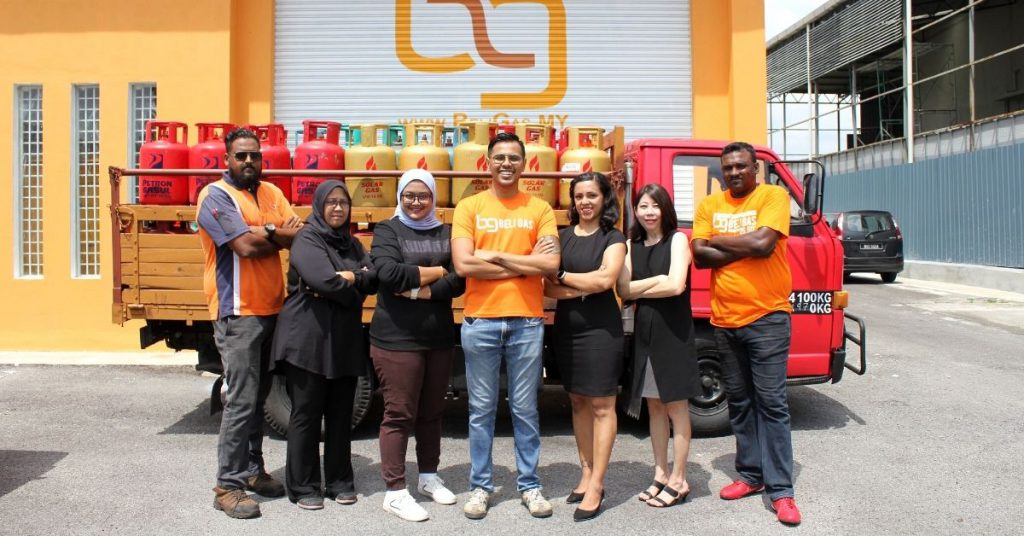[Written in partnership with BeliGas, but the editorial team had full control over the content.]
When we last wrote about BeliGas, the social enterprise prided itself on not only being a more affordable option for providing LPG gas cylinders, but also on its mission to hire B40 Malaysians and ex-convicts.
6 months later, it’s found a way to further add value to its services. As of June 2021, it’s enabled customers buying LPG gas to donate 1-10L of used cooking oil to get a subsidy on their gas.
Managing director of BeliGas, Suthan Mookaiah told Vulcan Post that this had always been part of the business plan from early on.
“But since we were operating on a lean model when we started, we had to focus on building the main part of the business first, which was to establish logistics and contact points across a wide geographical area, and then establish relationships and trust in the local communities that we serve.”
He believes that BeliGas is now ready to enter and establish themselves as a player in waste oil collection too.
Addressing multiple customer pain points
From his POV, customers nowadays are more prudent, and a business that can help them reduce their costs while being socially responsible will win their loyalty.
With that in mind, using waste cooking oil donations to subsidise gas prices just made sense. It’s a method that kills two birds with one stone: bring their gas retail price down by RM0.80 per litre of donated oil, and help users dispose of and recycle their waste oil properly.

Currently, BeliGas is limiting the oil donation amounts to a maximum of 10L per customer at any one time as they figure out the logistics on pickups.
Since they’re doing gas deliveries to homes on bikes, it’s not feasible for them to take in large donation amounts in one go. This isn’t a problem for their B2B customers, since they deliver on lorries for those.
To prevent abuse of this system, BeliGas has also outlined clear T&Cs in its app, among which are instructions to not add other substances inside the oil to bulk up its volume, and to avoid passing piping hot oil to the team.
So where does the oil go?
BeliGas’ HQ and its dealers (outlets) operate separately, thus when riders under a dealer collect the oil, the HQ will buy it. This allows BeliGas dealers to make more profit in their areas from other sources besides just selling gas alone.
The HQ then upcycles the oil into biodiesel for its own lorries or to be sold to other biodiesel users. It’s a process that’s efficient and safe for use with few modifications, Suthan stated.

There are other used oil byproducts such as glycerin which can be used by lubricant makers, but this is a plan BeliGas will only explore once it’s built up an operation of significant volume and created its own lab to experiment in.
Thus far, user reception to this new initiative has been excellent, Suthan said. “It is still new, of course, so we expect more people to only start collecting and disposing with us in the coming months (as their gas finishes). Even then, we have done multiple pickups from homes already.”
The team has collected 500L of used cooking oil since. When compared to their plan of collecting 15,000L by the second year of the initiative, they’ve only taken baby steps, but it’s still a good start.
A model that works for the startup
Suthan said that this initiative is a permanent addition to BeliGas’ services, and that they’re working on promoting it to raise awareness amongst their end consumers.
“In the future, we are hoping that we can collect about 3-5L of oil with every consumer that we serve. We hope to grow to serving 100K consumers, and if we hit this, we are really doing a major part in making our pipes, rivers, and sea cleaner of waste oil pollutants.”
Aside from providing value to its customers, BeliGas wants to continue providing employment to underserved communities in Malaysia too, especially during this pandemic.

It’s got over 66 underserved individuals on its payroll at the moment, and they aren’t restricted to roles as delivery riders either; some have been hired to work at BeliGas hubs and its HQ.
The model BeliGas has employed seems to be working well for it; in just shy of a year (July 2021 will mark one official year), the social enterprise has generated revenue amounting to about RM2.7 million.
To add, Suthan thankfully shared that the business is profitable too, crediting it to their differentiated value proposition amongst traditional providers.
As of now, BeliGas is already serving households and businesses in 214 locations across the Klang Valley, with plans to launch in other Malaysian states once the lockdowns have subsided.
Featured Image Credit: Suthan Mookaiah, Managing director of BeliGas











